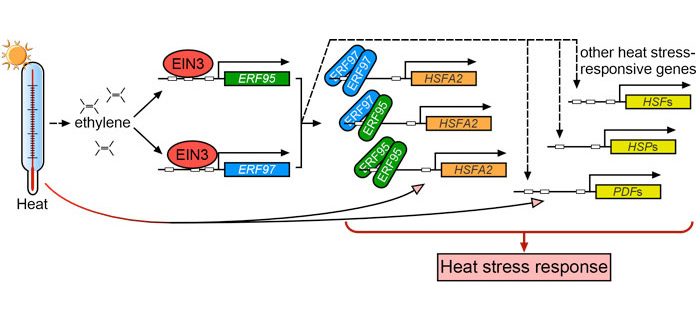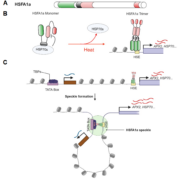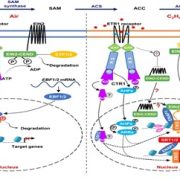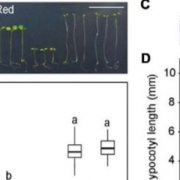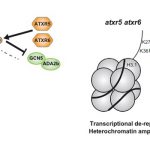The Role of Ethylene and Ethylene Response Factors in the Heat Stress Response
Summary: Huang et al. elucidate a link between ethylene signaling and heat stress responses. Plant Cell https://bit.ly/3pTjNBK
By Jianyan Huang, Xiaobo Zhao, Marco Bürger, Yurong Wang, Joanne Chory
Background: Temperature is an environmental factor that has one of the most dramatic effects on seasonal growth and geographic distribution of plants. During the past 200 years, human activity has increased the release of greenhouse gases, resulting in global warming. One side effect of global warming is a decrease in agricultural yield. Therefore, studying how plants respond to heat stress is important for maximizing agricultural production and promoting world food security in the coming years. Ethylene response factors (ERFs) display a great degree of functional plasticity and participate in the regulation of many biotic and abiotic stress responses, making them good candidates for engineering stress-tolerant crops.
Question: We wanted to know how ERF-mediated transcriptional regulation worked in plant heat stress response. We chose two ERF genes, ERF95 and ERF97, and studied their role in thermotolerance.
Findings: We found that ethylene, ERF95 and ERF97 are positive regulators in the heat stress response of Arabidopsis. Ectopic constitutive expression of ERF95 or ERF97 increases the thermotolerance of plants. These two ERFs act downstream of ethylene signaling component EIN3 and regulate a common set of downstream target genes in heat stress response. ERF95 and ERF97 can form protein dimers binding to the promoter of heat-responsive marker gene HSFA2 to regulate the expression of HSFA2. Together, our results establish a connection for ethylene, ethylene response factors and HSFA2 in the heat stress response of plants.
Next steps: Ectopic and constitutive expression of ERF95 and ERF97 led to the growth arrest of Arabidopsis, which would limit their biotechnological application. To overcome the growth-stress tradeoff will be the next step. One promising strategy for breeding thermotolerant crops is to use host-specific stress-inducible promoters to drive endogenous ERF95 and ERF97 in crops.
Jianyan Huang, Xiaobo Zhao, Marco Bürger, Yurong Wang, and Joanne Chory. (2021). Two Interacting Ethylene Response Factors Regulate Heat Stress Response. Plant Cell. https://bit.ly/3pTjNBK.


